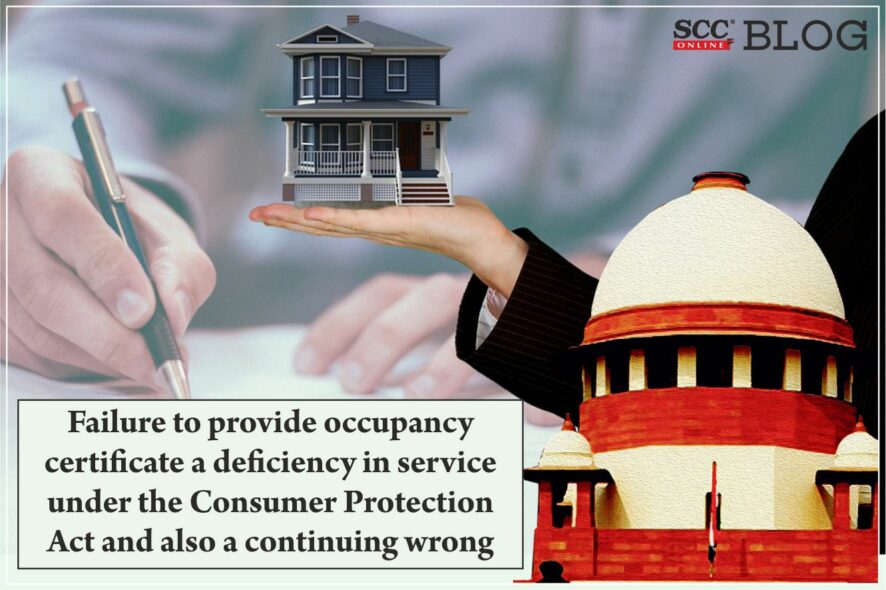Supreme Court: The bench of Dr. DY Chandrachud* and AS Bopanna, JJ has held that failure on the part of the builder to provide occupancy certificate is a continuing breach under the Maharashtra Ownership Flats (Regulation of the Promotion of Construction, Sale, Management and Transfer) Act 1963 and amounts to a continuing wrong.
Factual Background
The appellant is a co-operative housing society. The respondent constructed Wings ‘A’ and ‘B’ and entered into agreements to sell flats with individual purchasers in accordance with the Maharashtra Ownership Flats (Regulation of the Promotion of Construction, Sale, Management and Transfer) Act 1963 (MOFA). The members of the appellant booked the flats in 1993 and were granted possession in 1997. According to the appellant, the respondent failed to take steps to obtain the occupation certificate from the municipal authorities.
There was an obligation on the respondent to provide the occupancy certificate and pay for the relevant charges till the certificate has been provided, however, the respondent time and again failed to provide the occupancy certificate to the appellant society. For this reason, a complaint was instituted in 1998 by the appellant against the respondent. The NCDRC on 20 August 2014 directed the respondent to obtain the certificate within a period of four months. Further, the NCDRC also imposed a penalty for any the delay in obtaining the occupancy certificate beyond these 4 months. Since 2014 till date, the respondent failed to provide the occupancy certificate.
In the absence of the occupation certificate, individual flat owners were not eligible for electricity and water connections. Due to the efforts of the appellant, temporary water and electricity connections were granted by the authorities. However, the members of the appellant had to pay property tax at a rate 25% higher than the normal rate and water charges at a rate which was 50% higher than the normal charge.
Analysis
Obligations of Promoter under MOFA
Section 3 of the MOFA imposes certain general obligations on a promoter. These obligations inter alia include making disclosures on the nature of title to the land, encumbrances on the land, fixtures, fittings and amenities to be provided, and to not grant possession of a flat until a completion certificate is given by the local authority. The responsibility to obtain the occupancy certificate from the local authority has also been imposed under the agreement to sell between the members of the appellant and the respondent on the latter.
Sections 3 and 6 of the MOFA indicate that the promoter has an obligation to provide the occupancy certificate to the flat owners. Apart from this, the promoter must make payments of outgoings such as ground rent, municipal taxes, water charges and electricity charges till the time the property is transferred to the flat-owners. Where the promoter fails to pay such charges, the promoter is liable even after the transfer of property.
Limitation
In the instant case, the appellant submitted that since the cause of action is founded on a continuing wrong, the complaint is within limitation.
Section 24A of the Consumer Protection Act 1986 provides for the period of limitation period for lodging a complaint. A complaint to a consumer forum has to be filed within two years of the date on which the cause of action has arisen.
Section 22 of the Limitation Act 1963 provides for the computation of limitation in the case of a continuing breach of contract or tort. It provides that in case of a continuing breach of contract, a fresh period of limitation begins to run at every moment of time during which the breach continues
A continuing wrong occurs when a party continuously breaches an obligation imposed by law or agreement. The continuous failure to obtain an occupancy certificate is a breach of the obligations imposed on the respondent under the MOFA and amounts to a continuing wrong.
The appellants, therefore, were entitled to damages arising out of this continuing wrong and their complaint is not barred by limitation.
“Rejecting the complaint as being barred by limitation, when the demand for higher taxes is made repeatedly due to the lack of an occupancy certificate, is a narrow view which is not consonance with the welfare objective of the Consumer Protection Act 1986.”
Consumer
Section 2(1)(d) of the Consumer Protection Act defines a ‘consumer’ as a person that avails of any service for a consideration. A ‘deficiency’ is defined under Section 2(1)(g) as the shortcoming or inadequacy in the quality of service that is required to be maintained by law.
In the present case, the NCDRC had held that the appellant is not a ‘consumer’ under the provisions of the Consumer Protection Act as they have claimed the recovery of higher charges paid to the municipal authorities from the respondent. Extending this further, the NCDRC observed that the respondent is not the service provider for water or electricity and thus, the complaint is not maintainable.
The respondent was responsible for transferring the title to the flats to the society along with the occupancy certificate. The failure of the respondent to obtain the occupation certificate is a deficiency in service for which the respondent is liable. Thus, the members of the appellant society are well within their rights as ‘consumers’ to pray for compensation as a recompense for the consequent liability (such as payment of higher taxes and water charges by the owners) arising from the lack of an occupancy certificate.
[Samruddhi Co-operative Housing Society Ltd v. Mumbai Mahalaxmi Construction Pvt. Ltd, 2022 SCC OnLine SC 35, decided on 11.01.2022]






